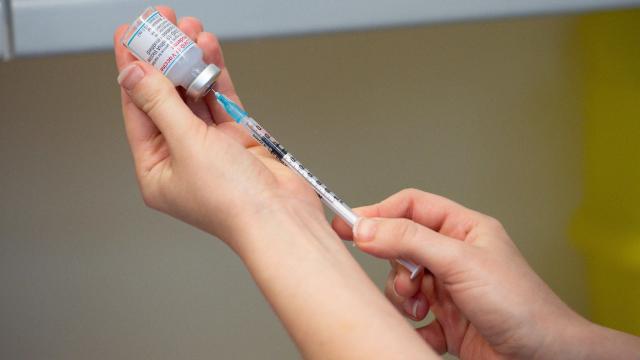New data from the UK suggests that some vaccinated people, particularly seniors, experience a greater loss in protection over time against covid-19 symptoms and severe illness than the general public. The findings were enough for the country’s vaccine experts to recommend booster shots for higher-risk groups, including all adults over 50.
On Tuesday, the UK’s Joint Committee on Vaccination and Immunization (JCVI) released their updated guidance on the question of booster doses. Their verdict was based on a recent analysis of real-world case data conducted by Public Health England.
There was both good and bad news to be found in the analysis. People between the ages of 40 and 65 given either the Pfizer/BioNTech or AstraZeneca/Oxford vaccine seemed to experience only a modest waning in their protection against symptomatic illness after six months, for instance (for Pfizer, it remained around 75%). But the drop was more substantial for those over 65, with the Pfizer vaccine’s effectiveness lowering from 80% soon after the second dose to 55% by the six-month mark.
The same pattern held true for severe illness. The Pfizer vaccine remained highly effective at preventing hospitalisation for all ages — over 92% — but did begin to wane gradually by the six-month mark. Once age was taken into account, though, the waning effect was very small to nonexistent for middle-aged people given the Pfizer shot, but it was larger for those over 65 and largest for people over 80. The analysis also looked at underlying health status and found that the decline in protection was much more pronounced for older people in poorer health, with 71% effectiveness against hospitalisation for these individuals. For those given the AstraZeneca shot, the waning effect was larger in general, though there was a wide range of estimates in how much it dropped after six months.
There wasn’t data available past three to four months for people under 40, who were only later eligible for the vaccine this year. Similarly, Moderna’s vaccine was approved in the UK in January, but doses weren’t available until mid-April. So there’s less long-term data available for either group, but protection in general seemed to stay high three to four months later for younger vaccinated people as well as those given Moderna.
“We observed limited waning in vaccine effectiveness against hospitalisation and death more than 20 weeks post-vaccination with [the AstraZeneca and Pfizer vaccine],” the authors wrote in their paper, now available as a preprint. “Waning was greater in older adults and those in a clinical risk group, suggesting that these individuals should be prioritised for booster doses.”
The JCVI reiterated that the vaccines continue to provide strong protection against severe illness and death. But to “maintain this high level of protection through the coming winter,” the experts advised that booster shots start to be offered to those at greater risk of serious disease as well as to groups that received the earliest vaccinations. This will include nursing home residents, people over 50, frontline health care and social workers, those living with immunocompromised individuals, and younger people with health conditions that raise their risk of severe covid-19. And boosters will be recommended no later than six months after the second shot moving forward, preferably with an mRNA vaccine.
The UK now joins nine other countries in recommending boosters for at least some residents, the Financial Times reported Wednesday. That list includes the U.S., though it is unclear how that strategy will pan out. Previously, the White House announced it would sanction boosters for the first groups of vaccinated by September 20 and then for everyone else eight months after the second dose. But some government and outside scientists have questioned whether boosters for all are needed at this time and have instead pushed for a more gradual introduction, starting with those most vulnerable to severe illness.
The new UK data, along with some U.S. data, does seem to suggest that waning immunity may be a greater concern for high-risk and older individuals than for the general population. But there are other wrinkles here, too. Soon into the vaccine rollout, the UK switched its dosing strategy, choosing to space out vaccine doses by eight to 12 weeks, while other countries stuck to a three-week interval, including the U.S. and Israel. And according to the JCVI, there is some evidence that the longer wait time between doses may have allowed immunity to stay more robust among these UK residents than it would for those who had a shorter vaccine schedule.
Other experts such as Anthony Fauci, the current chief medical advisor to President Biden, have disagreed with recent criticisms of the White House plan, arguing that data from Israel and elsewhere does point to a need for boosters across the board sooner than later. In Israel at least, there is already evidence that boosters have restored a substantial level of immunity to infection and severe illness, at least temporarily.
All eyes will be on a meeting this Friday of the Food and Drug Administration’s vaccine advisory committee, where outside experts will discuss the booster issue and all the data surrounding it. Though their recommendations aren’t binding, they’re likely to influence the FDA and CDC decisions on boosters.
